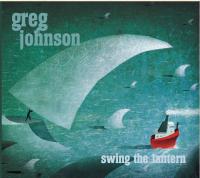Greg Johnson - Album Review: Swing The Lantern
 Greg Johnson is not an artist to be trifled with, the
prolific songwriter has a back catalogue of over 300 songs and with the release
of Swing the Lantern – his 11th studio album, he proves once again why he is regarded as one of New Zealand’s
most transcending, consistent and
beloved musicians.
Greg Johnson is not an artist to be trifled with, the
prolific songwriter has a back catalogue of over 300 songs and with the release
of Swing the Lantern – his 11th studio album, he proves once again why he is regarded as one of New Zealand’s
most transcending, consistent and
beloved musicians.
Swing the Lantern is Johnson’s own exercise in returning to more traditional recording methods, bringing in a few friends and some long-time cohorts to form a collaborative studio band, rather than hiring various available musicians to record in different studios . The effort has proved exceedingly worthwhile, the comprehensive sound of the album is extremely cohesive and slick.
Low Tide is the opening track, some raucous guitar over a steady, driving beat. The song ebbs and flows, as the tide sung of and transitions fluidly into the next piece. No Need for Invitations has a decidedly more relaxed feel and decrees that “an empty space, is the perfect place, for a party”.
There is no real overriding lyrical concept, each song is a standalone story, though there is a vague run-on of oceanic themed references that make the album feel decidedly mellow and beachy.
Why Won’t Love Give In? is a step up in tempo with a driving, thumping beat and some brilliant overlayed piano, it’s also my favourite piece from the collection. Further in, How the Sphinx Lost His Nose feels a little bit lost lyrically, but maintains the momentum towards the end of the record.
Overall, the album is a solid addition to a beloved body of work.
About Greg Johnson

His catalogue of over 300 songs includes many Kiwi classics such as Isabelle, Don’t Wait Another Day, Swagger and Now The Sun is Out with several becoming radio hits in New Zealand and the US.
His 11th studio album Swing The Lantern is a return to the style of production employed on earlier albums, where a band of players get together over several weeks to record the songs in a big studio all at once. The result captures the interactive nuances between players, the mood representing a moment in time - much like the perfect live concert.
Visit the muzic.net.nz Profile for Greg Johnson
Releases
Other Reviews By camy3rs
 Myele Manzanza - Album Review: OnePointOne (Live At The Blue Whale)
Myele Manzanza - Album Review: OnePointOne (Live At The Blue Whale)
20 Nov 2016 // by camy3rs
There are very few percussionists I can think of that would be able to pull off a live recorded album that falls even into the same league as OnePointOne (Live At The Blue Whale). From the opening bars of A Love Eclectic and onward throughout, the whole collection draws on many contrasting genres, cultures and aural motifs that somehow harmoniously flow out of and into each other.
Read More...
 Openside - EP Review: Push Back
Openside - EP Review: Push Back
21 Oct 2016 // by camy3rs
Admittedly, home grown pop-rock has never been a particularly easy sell in New Zealand, but when Openside started turning heads with last year’s single Worth It the group began a rather rapid ascent, opening for various international acts including Twenty One Pilots and Melanie Martinez, selling out their own secret headline show and culminating in the recent release of their debut EP Push Back. The collection opens up with the hook-laden All I Really Want – catchy as all hell, the song initially comes off as the kind of upbeat, self-help anthem you might put on a mix-tape for your best friend who was recently dumped.
Read More...
 Gig Review: Broods @ Vector Arena 15/07/2016
Gig Review: Broods @ Vector Arena 15/07/2016
02 Aug 2016 // by camy3rs
It’s a wee bit of a sad state how seldom a full line-up of Kiwi acts take the stage at Vector Arena, but hopefully after the success of Broods’ Conscious tour, we can see the wheels begin to turn a little more in favour of New Zealand bands. The night opened up with Blenheim-based newcomers, October.
Read More...
 Broods - Album Review: Conscious
Broods - Album Review: Conscious
12 Jul 2016 // by camy3rs
With the follow up to their 2014 debut album Evergreen, Broods are back again with another collection of the moody, atmospheric, dance-pop that gained them their notoriety. Conscious is a straight up beast of an album.
Read More...
 Kaushun - Album Review: Tonight
Kaushun - Album Review: Tonight
25 Jun 2016 // by camy3rs
Aside from having one of those names that makes fans wary of mispronounciation, Kaushun (pronounced as ‘Caution’), is a electronic music producer based in Auckland, but originally from Leeds in the United Kingdom. Tonight is the producers second album and a decent mix of run-of-the-mill dance/club beats, interesting electronica soundscapes and some high tempo pieces that wouldn’t go amiss on the soundtrack to a futuristic David Fincher film.
Read More...
 Gig Review: Avalanche City @ The Powerstation 03/06/16
Gig Review: Avalanche City @ The Powerstation 03/06/16
21 Jun 2016 // by camy3rs
Dave Baxter and ilk have become a rather large part of the quilt of Kiwi music – encompassing all of the personality traits that Kiwis seem to love in their icons, modest about his skill, understated in the news, seemingly soft spoken and dedicated to his practice. Avalanche City itself is a bit of a pop wonder - the roots in folk and country that set the band a part from other pop acts should (at least, to Kiwi audiences) be the proverbial bullet in the heart, and yet at every point they defy the odds.
Read More...
 Ladyhawke - Album Review: Wild Things
Ladyhawke - Album Review: Wild Things
05 Jun 2016 // by camy3rs
Pip Brown is the kind of musical artist I forever wish that the world had more of, - intuitive, intentional and innovative. Everytime a new Ladyhawke album is released, the incremental advances towards an even more polished, cohesive and genre defying sound are obvious.
Read More...
 Gig Review: Drax Project @ Neck Of The Woods, Auckland - 13/05/16
Gig Review: Drax Project @ Neck Of The Woods, Auckland - 13/05/16
04 Jun 2016 // by camy3rs
Roughly three years ago, I remember walking down Courtenay Place in Wellington and stumbling across a three-piece jazz ensemble playing top 40 pop and RnB covers outside of the Reading Cinema. I’ll tell you now, you have not heard Katy Perry until you’ve heard these guys play Hot ‘n Cold with a saxophone covering the entire lyrical line.
Read More...
Most Viewed Artists
Latest Galleries
NZ Top 10 Singles
- APT.
ROSÉ And Bruno Mars - DIE WITH A SMILE
Lady Gaga And Bruno Mars - BIRDS OF A FEATHER
Billie Eilish - TASTE
Sabrina Carpenter - I LOVE YOU, I'M SORRY
Gracie Abrams - ESPRESSO
Sabrina Carpenter - SAILOR SONG
Gigi Perez - LOSE CONTROL
Teddy Swims - A BAR SONG (TIPSY)
Shaboozey - GOOD LUCK, BABE!
Chappell Roan

























 Report A Problem
Report A Problem

